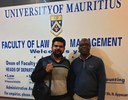The vertical organisation of the state remains a thorn in a flesh in post-colonial sub-Saharan Africa. Various forms of multilevel systems of government have been established throughout the continent, from federalism in Ethiopia (1996), Nigeria (1999) and South Sudan (2011); devolution in Kenya (2010) and South Africa (1996); to decentralised unitary systems in Uganda (1995) and Namibia (1990). These systems, which are often entrenched in the respective constitutions of these countries, have been adopted to advance the realisation of certain objectives linked to development, democracy and peace. National integration and the deepening of democracy in South Africa and many other countries is to a certain extent attributed to decentralised governance. However, some of these systems are not working well, especially on the development front, despite having been in place for some time. Others are yet to function effectively as they have not gained the much needed traction.
News
Food security is typically and administratively considered the exclusive concerns of national and provincial government, but a plausible case can be made that municipalities should and can also play a role.
Background: On 9 March 2017, the Constitutional Court (the Court) confirmed a decision of the High Court, which had declared the Local Government: Municipal Systems Amendment Act, 2011 (Amendment Act) unconstitutional and entirely invalid. The Amendment Act had mainly sought to make changes to the Local Government: Municipal Systems Act of 2000 (Principal Act) while making a minor related amendment to the Local Government: Municipal Structures Act of 1998. The process of its enactment had wrongly followed the procedure laid out under section 75 of the Constitution instead of the appropriate procedure under section 76. The Court confirmed this invalidity in the case of South African Municipal Workers’ Union v Minister of Cooperative Governance & Traditional Affairs and Others [2017] ZACC 7.
The Children’s Rights Project of the Dullah Omar Institute (DOI) at the University of the Western Cape welcomes the Constitutional Court of South Africa’s declaration that the common law defence of reasonable and moderate parental chastisement is unconstitutional. The DOI was one of the three partners that was granted permission to submit an amicus brief to the Constitutional Court.

Dr. Usang Maria Assim and Dr. Robert Nanima researchers with the Children’s Rights Project this week participated in a 3-day child rights strategic litigation training and case-identification workshop from 10 - 12 September 2019 in Mombasa, Kenya. The workshop organised by IHRDA and East Africa Child Rights Network falls within the framework of the African Children’s Charter Project (Phase II) coordinated by Plan International.
30 August 2019 - The clock is now also running out for the South African government’s lack of womxn-centric policy and action as a new analysis released today indicates the lack of feminist governance should have its own #TimesUp moment.

Both Ethiopia and South Africa place state-owned enterprises (SOEs) at the centre of their state-led development effort. In both countries, there is a strong and dominant ruling party/alliance, whose influence stretches into virtually all sectors of society. However, Ethiopia has not experienced large scale corruption in its SOEs. In fact, its SOEs seem to be doing well with Ethiopian Airlines as a prominent and shining example.

On 13 August 2019, Prof Ebenezer Durojaye of the Socioeconomic Rights Project delivered a guest lecture at the Faculty of Law and Management, University of Mauritius. His presentation focused on ‘The relevance of a rights-based approach to non-communicable diseases in Africa’.

The Dullah Omar Institute today submitted a petition to the South African Human Rights Commission (SAHRC) on the state of food insecurity in South African tertiary institutions. This petition was prompted by the recognition of an urgent need for intervention in South African tertiary institutions, related to food and nutrition (in) security.
The latest municipal audit results (2017-18) released by the Auditor-General (AG), Kimi Makwetu, found amongst others that a third of municipalities are not in a financial position to pay their creditors. The financial woes of municipalities weigh heavily on municipal creditors, in particular, bulk services suppliers, such as Eskom and water boards. As of June 2018, municipalities owed Eskom R18,26 billion with arrears amounting to R9,12 billion while debt to Water Boards stood at R 9,05 billion with arrears at R5,85 billion, respectively.
On 21 February 2019 the then Minister of Cooperative Governance and Traditional Affairs, Dr Zweli Mkhize, delivered his address on the Municipal Structures Amendment Bill in Parliament. In his address he stressed that the Amendment Bill is aligned to the tasks that President Cyril Ramaphosa mentioned when giving the State of the Nation Address in February 2019. Among these tasks is the need to accelerate inclusive growth, job creation, improving the education system, improving the conditions of life for all South Africans, fighting state capture and corruption, skills development and strengthening the State’s capacity to respond to the needs of the people. Dr Mkhize further stressed that the Amendment Bill will strengthen municipal governance and address the management of local government elections. It remains to be seen whether this will be yet another case of over-promising and under-delivering by our government or a win for effective governance in municipalities.
The Dullah Omar Institute is very proud to re-introduce the Local Government Bulletin, our regular newsletter with articles, updates and opinion pieces on local government law, policy and practice. The first Bulletin appeared in 1999, on the eve of the first democratic local government elections. The founding editors were Nico Steytler (now South African Research Chair in Multilevel Government) and Johann Mettler (now City Manager of Nelson Mandela Bay Metropolitan Municipality) assisted by Jaap de Visser (now Director of the Dullah Omar Institute).
